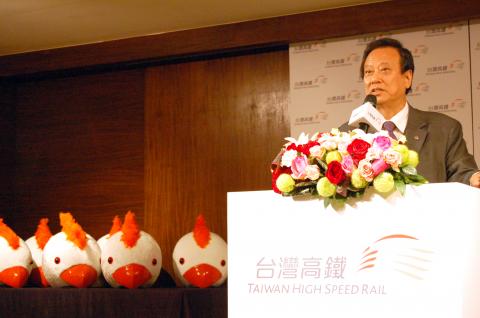The high-speed rail system will be extended to Taipei City’s Nangang District (南港) by 2015 amid efforts to ease congestion at Taipei Railway Station, the Bureau of High Speed Rail announced yesterday.
The bureau said the Taiwan Railway Administration (TRA) had appropriated land needed to build an underground tunnel connecting downtown Taipei and Nangang to the high-speed rail line in October, adding that the tunnel was scheduled to become operational by January 2015.
Like Taipei Railway Station, three main railway systems — TRA, Taiwan High Speed Rail Corp (THSRC) and the Taipei MRT — will also converge at Nangang Station, the bureau said.

Photo: Tseng Hung-ju, Taipei Times
The bureau said passengers from Keelung, Sijhih (汐止) in New Taipei City (新北市), Nangang and Neihu District (內湖) will be able to board the high-speed rail at Nangang Station, adding that this would greatly ease congestion at Taipei Railway Station.
Statistics from THSRC showed that an average of 60,000 high-speed rail passengers accessed the service through Taipei Railway Station daily last year.
That number rose to 62,000 in January.
Meanwhile, THSRC chairman Ou Chin-der (歐晉德) said -passengers on the high-speed rail could soon make reservations through their smartphones.
Under the system, passengers would receive a QR Code on their mobile phone after they -complete the transaction, Ou said. People will be able to enter the platforms by placing their phone close to the sensors at ticketing gates.
The company said the service would target passengers making seat reservations, adding that the number of reserved seats would be sent to the passengers’ phones.
The company also said that it was in talks with EasyCard Corp about the possibility of allowing people to access the high-speed rail using their EasyCard.
“We will make an official announcement when all the details are finalized,” Ou said.

CHANGING LANDSCAPE: Many of the part-time programs for educators were no longer needed, as many teachers obtain a graduate degree before joining the workforce, experts said Taiwanese universities this year canceled 86 programs, Ministry of Education data showed, with educators attributing the closures to the nation’s low birthrate as well as shifting trends. Fifty-three of the shuttered programs were part-time postgraduate degree programs, about 62 percent of the total, the most in the past five years, the data showed. National Taiwan Normal University (NTNU) discontinued the most part-time master’s programs, at 16: chemistry, life science, earth science, physics, fine arts, music, special education, health promotion and health education, educational psychology and counseling, education, design, Chinese as a second language, library and information sciences, mechatronics engineering, history, physical education

The High Prosecutors’ Office yesterday withdrew an appeal against the acquittal of a former bank manager 22 years after his death, marking Taiwan’s first instance of prosecutors rendering posthumous justice to a wrongfully convicted defendant. Chu Ching-en (諸慶恩) — formerly a manager at the Taipei branch of BNP Paribas — was in 1999 accused by Weng Mao-chung (翁茂鍾), then-president of Chia Her Industrial Co, of forging a request for a fixed deposit of US$10 million by I-Hwa Industrial Co, a subsidiary of Chia Her, which was used as collateral. Chu was ruled not guilty in the first trial, but was found guilty

Taiwan-based publisher Li Yanhe (李延賀) has been sentenced to three years in prison, fined 50,000 yuan (US$6,890) in personal assets and deprived political rights for one year for “inciting secession” in China, China's Taiwan Affairs Office spokesman Chen Binhua (陳斌華) said today. The Shanghai First Intermediate People’s Court announced the verdict on Feb. 17, Chen said. The trial was conducted lawfully, and in an open and fair manner, he said, adding that the verdict has since come into legal effect. The defendant reportedly admitted guilt and would appeal within the statutory appeal period, he said, adding that the defendant and his family have

DEADLOCK: As the commission is unable to forum a quorum to review license renewal applications, the channel operators are not at fault and can air past their license date The National Communications Commission (NCC) yesterday said that the Public Television Service (PTS) and 36 other television and radio broadcasters could continue airing, despite the commission’s inability to meet a quorum to review their license renewal applications. The licenses of PTS and the other channels are set to expire between this month and June. The National Communications Commission Organization Act (國家通訊傳播委員會組織法) stipulates that the commission must meet the mandated quorum of four to hold a valid meeting. The seven-member commission currently has only three commissioners. “We have informed the channel operators of the progress we have made in reviewing their license renewal applications, and